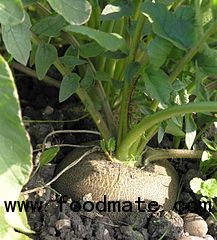
I.G. Castro-Torres of Facultad de Química Farmacéutica Biológica, Universidad Veracruzana, Xalapa, Veracruz, Mexico and colleagues conducted the study and found using the juice extracted from a type of black radish (Raphanus sativus L. var. niger) for days eliminated cholesterol gallstones and decreased serum levels of cholesterol and triglycerides in female mice.
For the study, female C57BL/6 mice were fed a lithogenic diet, a gallstone diet that consists often of fat, cholesterol and cholic acid, to induce cholesterol disorders. Some of the mice on the diet were then treated with the black radish juice and then histopathological properties of the gallbladder and liver, and serum cholesterol levels, high density lipoprotein (HDL) cholesterol and triglycerides levels were measured.
Mice on the lethogenic diet developed cholesterol gallstones; increased serum cholesterol and triglycerides levels, and decreased HDL; also gallbladder wall thickness increased significantly, accompanied by epithelial hyperplasia and increased liver weight.
These mice received treatment with black radish juice for merely six days and had cholesterol gallstones removed significantly from the gallbladder; and also had cholesterol and triglycerides levels decreased. Additionally, the black radish juice treatment boosted levels of HDL cholesterol, which is considered a beneficial cholesterol.
However, the traditional medicine did not reverse epithelial hyperplasia and granulocyte infiltration and liver tissue continued to show vacuolar degeneration.
The researchers concluded "The juice of black radish root has properties for treatment of cholesterol gallstones and for decreasing serum lipids levels; therefore, we confirm in a preclinical study the utility that people give it in traditional medicine."







